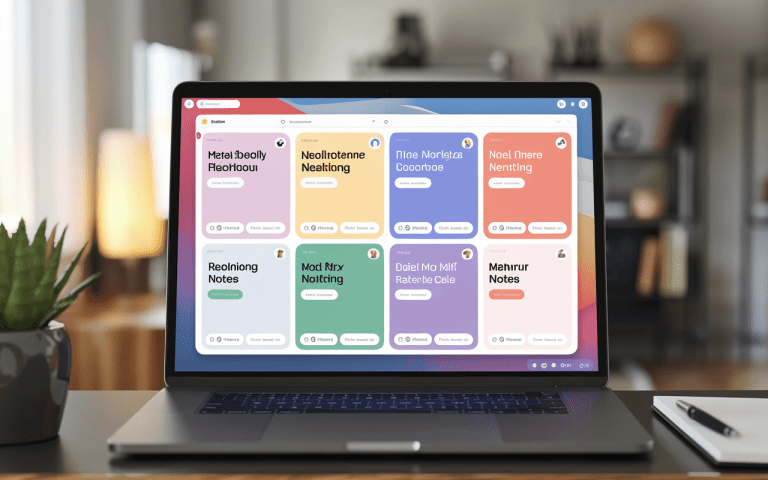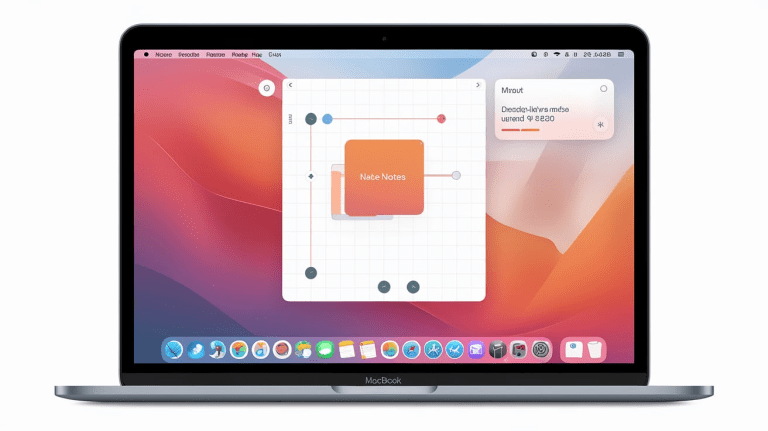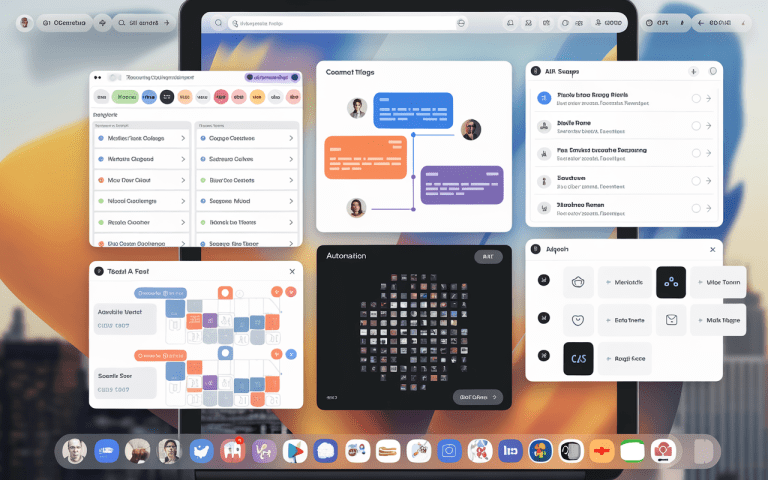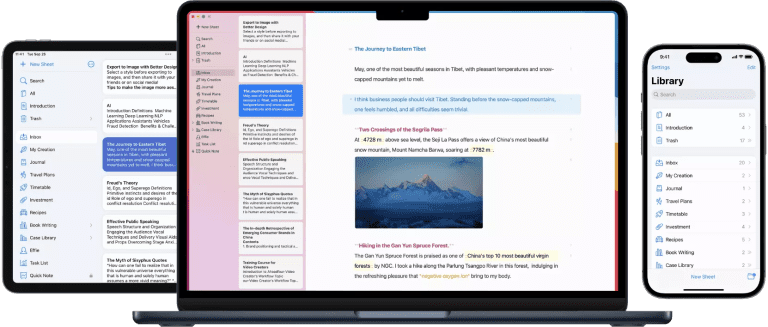Reusable Notebook for Sustainable Notes
As people focus on greener choices, sustainable stationery and environmentally conscious notetaking help make a positive impact. A simple notebook might just be the answer. What makes resuable notebook like sustainable stationery special? Let’s explore how these environmentally conscious notetaking tools are transforming the way we capture our ideas.

Reusable notebook
Effie offers a digital-first alternative that complements your eco-friendly notebook by providing a zero-waste writing environment, minimizing the need for physical materials without compromising on note-taking experience.
Key Takeaways
- Because our notebooks are long-lasting, taking notes becomes more environmentally responsible and thoughtful.
- Effie blends AI technology with eco-friendly notepads to make green office supplies smarter.
- Choose reusable notebooks for mindful note-keeping that reduces waste and creates a more sustainable workspace.
From Ancient to Modern: The Story of Note-Taking
From ancient papyrus to modern sustainable stationery, note-taking has transformed. Today’s zero-waste writing tools and reusable notebooks show how far we’ve come from those early scrolls and tablets.
Exploring the Rich History of Written Records
In the Middle Ages, most monks wrote on traditional parchment with quills and ink. This work has lasted for centuries. The Books are too became more widely available in the 15th century thanks to the printing press.
From fountain to the pens to keyboards, writing tools transformed so much how we capture ideas throughout history. These changes in sustainable stationery paved the way for today’s eco-friendly notepads and mindful note-keeping methods. They started a new chapter in note-taking that keeps growing.
The Advent of Digital Note-Taking and Its Impact
The 20th century saw a big change with digital technology. Typewriters and computers made note-taking easier. But, both paper and digital notes have environmental concerns. Now, eco-friendly reusable notebooks are becoming popular. They offer a green option that’s also modern and convenient. Effie complements reusable note-taking with its AI features that reduce the need for physical notebooks, supporting zero-waste writing in a green office supply environment.
The Environmental Impact of Traditional Note-Taking Methods
Traditional note-taking methods, whether on paper or digital tablets, harm the environment. The Environmental Paper Network says making a single sheet of paper without recycled material releases 0.02 kg of carbon dioxide. An iPad, on the other hand, uses 3 watts of power per hour and emits 0.002 kg of CO2. It would take over 7 hours of iPad use to match the CO2 emissions of a single sheet of paper.
Even with recycled paper, the environmental damage is still significant. Paper production leads to carbon emissions, deforestation, paper waste, and water usage. This shows we need better, greener options. Effie’s eco-friendly notepad approach not only eliminates paper waste but also aligns with mindful note-keeping practices by offering recycled paper journal-inspired features within its sustainable digital platform.
Comparing the Carbon Footprint of Paper and Tablets
The study used six years of journaling with 250 words a day as its basis. It looked at climate change, ecotoxicity, land use, fossil resource use, and water use. The Effie app also allows for sustainable note-taking digitally, aligning with environmentally conscious notetaking practices that lower emissions and resource consumption compared to traditional notebooks.
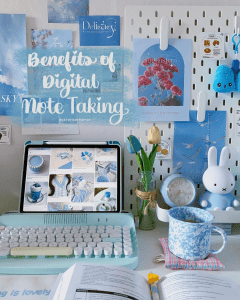
Addressing Deforestation, Waste, and Water Usage
Recycled paper helps, but both paper and digital methods have environmental drawbacks. Tablets need rare earth metals, often mined in sensitive areas. It’s crucial to find sustainable ways to take notes.
Each year, Americans use 70 million tons of paper products, harming forests. Zero-waste writing tools like reusable notebooks help solve this problem by lasting for years, reducing the need to buy new paper notebooks.
| Note-Taking Method | Carbon Footprint | Resource Consumption | Environmental Impact |
|---|---|---|---|
| Paper Notebook | 0.02 kg CO2 per sheet | Deforestation, water usage | High |
| Digital Tablet (iPad) | 0.002 kg CO2 per hour | Rare earth metals, mining issues | Moderate |
| Reusable Notebook | Minimal (depends on usage) | Reduced resource consumption | Low |
Choosing sustainable note-taking methods depends on how we use them. By using what we already have, we can reduce environmental harm. Understanding the impact of traditional methods helps us choose better, like reusable notebooks, for a greener future.
Sustainable Alternatives: Reusable Notebook for Eco-Friendly Note-Taking
Looking to take notes in a more planet-friendly way? Zero-waste writing tools like reusable notebooks give you a better choice than regular paper. These eco-friendly notepads help you write again and again while protecting our environment and saving resources.
Made from recycled materials like bamboo and sugarcane, these zero-waste writing tools are better for our planet than regular notebooks. Effie’s AI features work perfectly with these environmentally conscious notetaking solutions, making green office supplies both smart and sustainable.

These notebooks function are made to be used over and over again. They cut down on paper waste and use less resources. They’re made from cool recycled stuff like bamboo and sugar cane sometimes a mix of both making them way greener than regular paper notebooks. And with Effie’s AI-powered, eco-friendly notepad features, you can jot down your thoughts sustainably without even needing a physical notebook!
Using sustainable stationery like reusable notebooks helps create a greener future. These mindful note-keeping tools reduce our environmental impact with every use.
Eco-Friendly Materials for Sustainable Notebooks
Eco-friendly notebooks are getting super popular with most of The people who care about the environment. They’re made from renewable and recyclable materials, so they’re way better for the planet!. These materials contribute to a less environmental footprint. Effie AI also contributes to this movement by providing sustainable stationery solutions through AI-driven note-taking that eliminates the need for physical materials.
Recycled Paper and Upcycled Materials
Recycled paper is a key material in eco-friendly notebooks. It comes from waste like old magazines and animal feces. This reduces the need for new paper. Effie, with its green office supplies focus, combines recycled paper journal ideas into digital form, reducing waste even further by offering reusable note-taking without the need for physical materials.
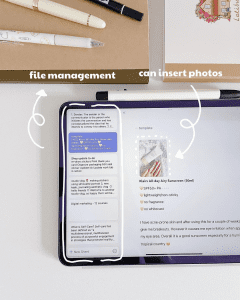
Bamboo and Sugar Cane: The Power of Renewable Resources
Eco-friendly notebooks tap into renewable resources like some bamboo and sugar cane. The Bamboo grows super fast and is one of the most renewable materials out there! It makes durable, biodegradable notebooks. Effie integrates plastic-free notebooks concepts with sustainable stationery tools.
Thanks to these renewable materials and recycled resources, we have eco-friendly notebooks. They help reduce waste and promote sustainable resources and degradable materials. As more people want sustainable note-taking, these methods will shape the notebook market’s future.
The Production Process of Eco-Friendly Reusable Notebooks
Making eco-friendly reusable notebooks is a careful process. It starts with choosing sustainable materials like recycled paper. They also use bamboo and sugar cane and biodegradable binding materials. This helps reduce harm to the environment. Effie complements this sustainable approach by providing an entirely zero-waste writing experience, ideal for green office supplies setups.
Sustainable Binding and Packaging
Eco-friendly notebooks also focus on environmentally-conscious binding and packaging. The binding uses non-toxic adhesives and recycled cardboard or cloth. This makes the notebooks fully biodegradable. The packaging is also made from recycled cardboard or paper. It can be recycled again, reducing waste.
By choosing sustainable materials and printing, and using responsible packaging, these notebooks are made with care. This shows the makers’ dedication to being green. It meets the need for sustainable and eco-friendly stationery and office supplies.
Top Eco-Friendly Reusable Notebook Brands
Many eco-friendly stationery brands are now leading the way. They focus on making sustainable and reusable notebooks. These companies use tree-free, recycled, and renewable materials for environmentally aware consumers.
PoopooPaper stands out with notebooks made from recycled elephant poop. Onyx and Green uses leftover sugarcane pulp, needing less energy and water than regular paper. EcoPaper makes notebooks from banana paper, which is tree-free and biodegradable. Karst offers notebooks from recycled stone paper.
joins these eco-friendly brands by supporting sustainable note-taking practices and making green office supplies accessible through digital solutions, aligning with eco-conscious stationery choices.
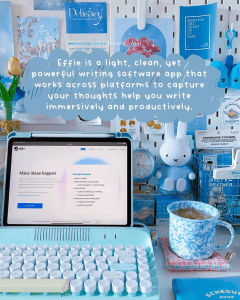
These brands are making a big difference by reducing waste and environmental harm. They offer new ways to take notes that are better for our planet. This meets the growing so much of a need for eco-friendly alternatives to traditional notebooks.
As the demand for sustainable stationery grows, most of these brands are leading the way. They show us how to take notes and organize ourselves in a more environmentally friendly way.
How We Extending the Life Cycle: Recycling and Repurposing Notebooks
Eco-friendly reusable notebooks should be recycled and reused. A notebook’s cover and pages can be recycled after they are no longer useable. The paper can turn into new things like newspaper or tissue paper.
The Effie platform adds another layer of sustainability by providing reusable note-taking tools that eliminate the need for disposal altogether, reducing waste and promoting mindful note-keeping in digital form.
Research shows that reusing products is best for the environment. It makes products last longer and saves energy. This is especially true for electronics.
Repurposing lets us get creative with old products. For example, parts from old computers can become new thin client computers. This reduces waste and makes products useful again.
Making prudent use of resources is encouraged by the circular economy. It motivates us to fix, restore, and reuse. In this manner, we can prolong the life of notebooks and lessen environmental damage.
Conclusion: Embracing Sustainable Note-Taking with Reusable Notebooks
We should make an effort to lessen our influence on the environment. Reusable notebooks offer a green way to take notes. Brands like Rocketbook help make environmentally conscious notetaking simple.
Made with recycled and biodegradable materials, these zero-waste writing tools reduce both waste and carbon footprint. Paper waste is reduced because pages can be erased and reused repeatedly. Additionally, they are compatible with digital tools like Google Drive and Evernote, which makes the transition from paper to digital notes simple.
Making environmentally friendly decisions is aided by selecting sustainable note-taking solutions, such as reusable notebooks. It doesn’t imply we have to stop being convenient or productive. We’re making significant progress toward a greener future by using these notebooks.
FAQ
Eco-friendly reusable notebooks: what are they?
Eco-friendly notebooks help protect our planet by lasting longer than regular paper notebooks. These sustainable stationery choices cut down on waste while saving trees and resources. Natural resources like bamboo or repurposed materials are frequently used in these notebooks.
What are the advantages of utilizing reusable, environmentally friendly notebooks?
Our reusable notebooks help you make a difference. These sustainable stationery options reduce waste and save resources. Made with earth-friendly bamboo and recycled paper, and our eco-friendly notepad uses green printing methods. The environmentally conscious notetaking solution features plastic-free notebooks with sustainable binding. Our zero-waste writing products are designed for multiple uses, making them perfect reusable note-taking tools. Choose these green office supplies for mindful note-keeping that lasts longer and helps protect our planet.
What components go into creating environmentally friendly reusable notebooks?
Our reusable notebooks use earth-friendly materials like recycled magazine paper, repurposed plastic bottles, and natural fibers from sugarcane and bamboo. Perfect for sustainable stationery lovers and zero-waste writing enthusiasts.
How are eco-friendly reusable notebooks produced?
Making these notebooks involves picking sustainable materials and eco-printing. Manufacturers focus on using recycled paper and renewable resources. They also choose inks that are better for the planet.
What are some top eco-friendly reusable notebook brands?
Among the leading brands are: PoopooPaper: Repurposed elephant feces used to make notebooks Onyx and Green: Sugarcane pulp notebooks EcoPaper: Banana paper notebooks Karst: Recycled stone paper notebooks 18HOCH²: Repurposed coffee cup notebooks
How may environmentally friendly reusable notebooks be recycled and disposed of?
When these notebooks are no longer needed, it’s critical that they be recycled. You can recycle the pages and the cover individually. the paper goes to a recycling plant, and the spine can be used for crafts.
Source Links
- What is a Smart Notebook? | CenturyLink – https://discover.centurylink.com/smart-notebook-zero-waste-office.html
- 7 Sustainable Notebooks & Journals For All Your Eco-friendly Scribbles – https://www.sustainablejungle.com/sustainable-living/eco-friendly-notebooks
- What are the best reusable notebooks for professionals who want to reduce paper waste? – https://www.linkedin.com/advice/0/what-best-reusable-notebooks-professionals-utgbc
- Benefits of Eco-Friendly Notebooks | Paperdec – https://paperdec.com/blogs/paperdec-magazine/benefits-of-eco-friendly-notebooks?srsltid=AfmBOorGbyP4bA_TH_-BRXAdpillu4M9jydn3gTppYMm-XI9kH3THuVM
- Eco Friendly Erasable Notebook – Greenstory – http://thefairedit.com/2018/10/21/eco-friendly-notebook-green-story/
Unlock Smarter Note-Taking with Effie
Embrace a greener workspace and streamline your ideas digitally today!
Try Effie Free
